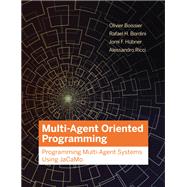Multi-Agent Oriented Programming Programming Multi-Agent Systems Using JaCaMo
, by Boissier, Olivier; Bordini, Rafael H.; Hubner, Jomi; Ricci, Alessandro- ISBN: 9780262044578 | 0262044579
- Cover: Hardcover
- Copyright: 9/15/2020
A multi-agent system is an organized ensemble of autonomous, intelligent, goal-oriented entities called agents, communicating with each other and interacting within an environment. This book introduces the main concepts and techniques of multi-agent oriented programming, (MAOP) which supports the multi-agent systems paradigm at the programming level. MAOP provides a structured approach based on three integrated dimensions, which the book examines in detail: the agent dimension, used to design the individual (interacting) entities; the environment dimension, which allows the development of shared resources and connections to the real world; and the organization dimension, which structures the interactions among the autonomous agents and the shared environment.
The book puts the approach into practice using the JaCaMo programming model and platform. It employs an easy-to-follow, step-by-step style, showing solutions to increasingly complex scenarios. The book also discusses the integration of MAOP into existing technologies and application domains, including mobile computing, web-based computing, and robotics. Finally, it considers artificial intelligence (AI)–related classical problems from an MAOP perspective and discusses an agent-oriented approach to software engineering.







